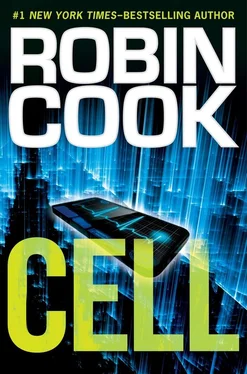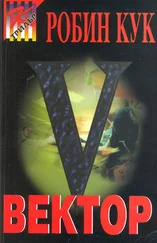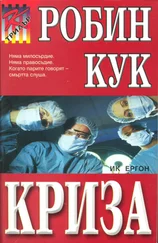As fate would have it, the airplane magazine had an article about a phone app that could anticipate heart attacks. That had been the stimulus that made him think about the phone as a primary-care doctor. There were already six billion cell phones in the world and the technology was there; it just needed to be channeled. Although he didn’t do anything about this revelation — what could he do as a first-year resident — he did mention the idea to Paula when he finally did get in touch with her.
They had met for a drink, and after some small talk he told her his mom’s sad story and his idea of a cell phone functioning as a full-blown primary-care physician. He was convinced a device like that would have been a godsend to his mother and probably would have saved her life.
Paula was immediately taken by the concept and told him the idea was perfect for Amalgamated, which alarmed George. It was his belief that if anybody did it, it should be the medical profession, not an insurance company, since the smartphone, in a very real way, would be practicing medicine. Paula’s response was to laugh, pointing out that the medical profession would never get around to it, having dragged their collective feet at the idea of competition of any sort as well as their disinclination to embrace the digital world.
In the end, George’s effort in reconnecting with Paula didn’t pan out. As busy as he was with his first year of residency, he didn’t call her for months, and when he did, she declined the offer of getting together. The next time he had heard from her was just the previous week, when she texted him the invitation to the event out of the blue. The fact that the presentation was about the smartphone being a primary-care physician was a complete and total surprise.
George again considered getting up and walking out. She obviously latched on to his idea and ran with it without any attempt to connect with him even just to acknowledge his contribution. George squirmed in his seat, his mind racing to think of what to do about it. He shifted his weight to stand and leave. The man next to him even moved to let him by, but George didn’t get up. Instead he relaxed back into his seat. What purpose would it serve to walk out? Just wanting to get away was a childish response.
It ended up being a good thing that he stayed, too. Thorn still had a few surprises. “Amalgamated Healthcare is proud and will be announcing to the media that we are near the end of a very successful beta test of the iDoc algorithm and app. For almost four months, twenty thousand people here in the Los Angeles metropolitan area, who had signed strict NDAs, or nondisclosure agreements, have been using the iDoc app with truly phenomenal success. As a primary-care physician, iDoc has proven itself to be utterly reliable, far better than a flesh-and-blood general practitioner under our current health care system. And this sentiment comes directly from our participant surveys. Enrollees love it!”
George swallowed with some difficulty. His mouth had gone dry. He’d seen the iDoc app on Kasey’s phone but had not known what it was, and she hadn’t told him. She had been part of Amalgamated’s beta test! The news also gave him a queasy feeling in the pit of his stomach.
As Thorn went on to explain that iDoc would be immediately and immensely profitable, George shook his head with a mixture of disgust and admiration. iDoc was going to be performing an end run around the whole medical industry. It was about to become the doctor!
“Please!” Thorn called out after allowing the excited murmuring that had erupted to continue, obviously enjoying the moment. “Let me make one more point before I turn the floor over to Dr. Stonebrenner to provide technical details. With the success of iDoc’s beta test, Amalgamated is about to launch the program nationally. Concurrently, we will also be looking to license the program internationally, particularly in Europe. To that end we’ve been in negotiations with multiple countries, particularly those with extensive, dependable wireless infrastructure. I can confidently report that negotiations are rapidly progressing. The need for iDoc is global. Of course, this underlines how very good an investment in Amalgamated Healthcare is. We are about to conclude deals with several hedge funds, but another round of funding will be required. Our market is global. Our market is massive. Now let me turn the floor over to Dr. Stonebrenner.”
As Paula stepped forward, George did a rapid Internet search for the meaning of a beta test. He vaguely recalled hearing the term but wouldn’t be able to define it if he was pressed. He quickly found out that it’s a term for the second round of software testing in which it’s used by a limited but sizable audience to ascertain user acceptance while at the same time seeking to identify and fix glitches or problems.
As Paula began speaking George wasn’t sure how he felt about her taking over his idea without even getting in touch with him. At the same time he realized he hadn’t exactly pursued her.
“Think of iDoc as the Swiss army knife of health care,” she was saying. “Attachable sensors and independent probes that communicate wirelessly will make the phone a versatile mobile laboratory.” As Paula spoke, a slick video presentation demoed the app’s capabilities. “The property of capacitance is what enables smartphone touchscreens to sense our fingertips. But the screens also have the ability to detect and analyze much smaller things, like DNA or proteins to enable it to identify specific pathogens or particular disease markers. An Amalgamated client could simply place a saliva or blood sample directly onto the touchscreen for an analysis, and treatment would be based on the patient’s past medical history and unique genomic makeup. Recent leaps forward in nanotechnology, wireless technology, and synthetic biology make iDoc possible. With our supercomputer we will constantly monitor, in real time, a host of physiological data on all iDoc users of all vital signs. The sky is the limit. iDoc can even extend into the psychological realm because iDoc has the ability to monitor the client-patient mood, particularly in relation to depression, anxiety, or hyper states, and then communicate with the patient accordingly for on-the-spot counseling or referral to a mental health specialist.”
Paula then went on to describe how the app is able to monitor many of these functions, in particular those followed routinely only in an intensive-care unit, by the use of a bracelet, ring, or wristband with built-in sensors that communicate with the phone wirelessly. She demoed special eyeglasses that can be worn for additional monitoring of the real-time function of blood vessels and nerves in the retina of the eye, the only true window on the interior of the body. She explained that a continuous recording is made of the EKG and, if needed, the smartphone can function as an ultrasound device for studying cardiac function by merely having the patient press it against his chest.
Paula paused for a moment and stared out at the audience. From their stunned silence she knew she had their undivided attention. “Okay,” she said soothingly, switching gears, “so the question then becomes, what will iDoc do with this enormous wealth of real-time data? I will tell you. It will do what any good doctor would do and do it better, much better. Thousands of times a second all the data will be correlated via its cloud service by the Amalgamated supercomputer with the client-patient’s full medical history, the client-patient’s known genomic information, and the totality of current medical knowledge that is being updated on a continuous basis.”
Paula then gave a specific example and talked about the app’s ability to diagnose a heart attack, not only when it is happening, but also well before, so that it would have the ability to alert the patient days before the attack was going to occur. Paula then touched on iDoc’s ability to follow and treat chronic diseases like diabetes. With iDoc and an implanted reservoir of insulin, blood sugar could be tracked in real time and the correct amount of insulin could be released automatically to keep the patient’s blood sugar continually normal. In a very real way, for a diabetic, iDoc is essentially curative.
Читать дальше












